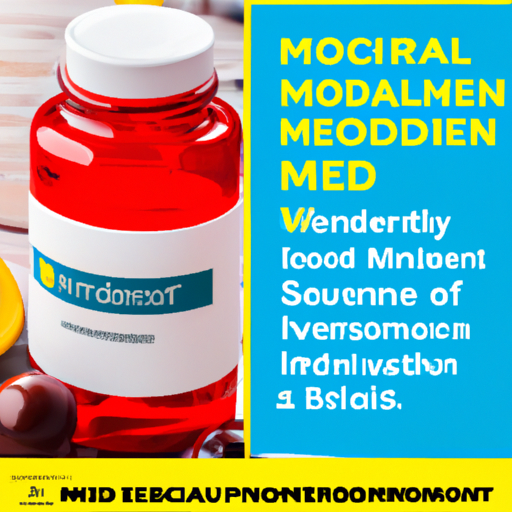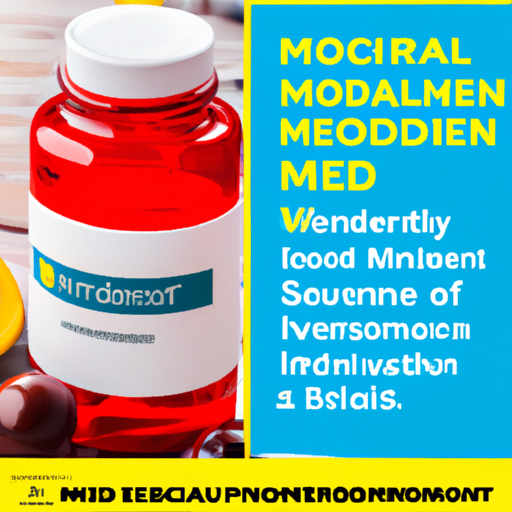In this article, we explore the intriguing question of whether or not supplements have the ability to enhance your mood. We often turn to various options in our pursuit of happiness and well-being, and the world of supplements presents a tempting avenue to explore. Delve into this fascinating topic as we uncover the potential benefits and limitations of mood-enhancing supplements, shedding light on the science behind these promising substances. So, put on a smile and get ready to embark on a journey that could potentially brighten your day.

This image is property of images.unsplash.com.
Understanding Mood and Emotions
Explanation of mood and emotions
Mood refers to a general and long-lasting state of mind that influences how you perceive and interact with the world around you. It encompasses your emotional state and can range from positive (such as happiness or contentment) to negative (such as sadness or anxiety). On the other hand, emotions are more transient and specific reactions to a particular situation or event. They can be intense and short-lived, such as feeling joyful after receiving good news or feeling angry when faced with an injustice. Both mood and emotions play a significant role in shaping our overall well-being.
Different factors affecting mood
Numerous factors can impact your mood, ranging from external influences to internal biological processes. External factors, such as your social environment, interpersonal relationships, and life events, can greatly influence your mood. For example, a supportive network of friends and family can contribute to a positive mood, while experiencing stress or conflicts may lead to negative emotions.
Additionally, internal factors, such as genetics, hormones, and brain chemistry, also play a crucial role in determining your mood. Some people may have a predisposition to certain mood disorders due to their genetic makeup, while others may experience fluctuating moods due to hormonal imbalances. Understanding these factors can help in finding effective ways to regulate and enhance mood.
Role of neurotransmitters in mood regulation
Neurotransmitters are chemical messengers that facilitate communication between nerve cells in the brain. They play a vital role in regulating various functions, including mood. One neurotransmitter closely associated with mood is serotonin. Serotonin helps regulate emotions, promote feelings of well-being, and contributes to overall mood stability. An imbalance in serotonin levels has been linked to conditions like depression and anxiety. By understanding the role of neurotransmitters, scientists and researchers have been able to develop approaches to enhance mood through various interventions.
Biological Basis of Mood Enhancement
How brain chemistry affects mood
The complex workings of the brain chemistry significantly influence mood. Neurons constantly communicate with each other through electrical signals, and the balance of neurotransmitters determines the overall mood state. For example, lower levels of serotonin are often associated with depressive symptoms, while higher levels of dopamine may contribute to a sense of pleasure and reward.
How nutrition can influence mood
The food we consume provides the necessary nutrients for our bodies to function optimally, including our brain chemistry. Research suggests that certain dietary factors can influence mood. Adequate consumption of high-quality proteins, complex carbohydrates, and healthy fats can support neurotransmitter production and regulation, contributing to a positive mood. On the other hand, a poor diet lacking in essential nutrients can lead to imbalances that negatively impact mood.
Role of vitamins and minerals in mood regulation
Vitamins and minerals also play an important role in mood regulation. Deficiencies in key nutrients such as vitamin B6, vitamin D, folate, and magnesium have been associated with mood disorders such as depression and anxiety. These nutrients are involved in the synthesis and metabolism of neurotransmitters, making them essential for maintaining optimal mood.
Function of serotonin in mood enhancement
Serotonin, often referred to as the “feel-good” neurotransmitter, plays a crucial role in mood enhancement. It helps regulate sleep, appetite, and libido while promoting a sense of calm, relaxation, and happiness. Selective serotonin reuptake inhibitors (SSRIs), commonly prescribed antidepressant medications, work by increasing serotonin levels in the brain. This suggests that maintaining optimal serotonin levels through various means, including supplements, can have a positive impact on mood enhancement.
Supplement Use: General Overview
The growing trend of supplement use
In recent years, there has been a noticeable increase in the use of supplements for various purposes, including mood enhancement. People are turning to supplements as a convenient way to support their overall well-being, including their mental health. Supplements offer a wide range of options that can cater to individual needs and preferences.
Types of supplements available
There is a vast array of supplements available on the market, each targeting different aspects of mood enhancement. Some popular mood-enhancing supplements include St. John’s Wort, Omega-3 fatty acids, 5-HTP, and Vitamin D. These supplements aim to provide specific nutrients that support brain chemistry and neurotransmitter regulation, ultimately promoting a positive mood.
Common reasons for supplement use
Individuals turn to mood-enhancing supplements for various reasons. Some may be looking for a natural alternative to traditional medications for managing their mood, while others may be seeking a complementary approach to conventional treatments. Additionally, individuals who experience mild mood fluctuations or desire overall mental well-being may also incorporate mood-enhancing supplements into their routine.
Effectiveness of Supplements on Mood Enhancement
Overview of existing research
While the use of supplements for mood enhancement is gaining popularity, it is essential to evaluate the existing body of research to determine their effectiveness. Several studies have focused on understanding the impact of various supplements on mood regulation. These studies provide valuable insights into the potential benefits and limitations of supplement use.
Results of clinical trials
Clinical trials are conducted to assess the efficacy and safety of interventions, including supplements. Some clinical trials have shown promising results, suggesting that certain supplements can have a positive impact on mood. However, it is important to note that every individual may respond differently to supplements, and further research is needed to establish consistent findings.
Comparison of supplement effectiveness on mood
There are significant variations in the effectiveness of different supplements on mood enhancement. While some supplements may work well for certain individuals, they may not have the same impact on others. Factors such as individual biochemistry, dosage, and overall health can influence how well a supplement works in enhancing mood. It is advisable to consult with a healthcare professional to determine the most suitable supplement for individual needs.

This image is property of images.unsplash.com.
Examples of Mood-Enhancing Supplements
Detailed look at St John’s Wort
St. John’s Wort is a herbal supplement that has been traditionally used to alleviate symptoms of mild to moderate depression. It is believed to work by increasing levels of neurotransmitters such as serotonin, dopamine, and norepinephrine in the brain. While studies regarding its effectiveness have shown mixed results, some individuals have reported improvements in mood when taking St. John’s Wort under professional guidance.
Examining Omega-3 fatty acids
Omega-3 fatty acids, commonly found in fish oil and other sources, have gained attention for their potential mood-enhancing properties. These essential fatty acids play a crucial role in brain health and have been associated with a reduced risk of depression. Research suggests that supplementing with omega-3 fatty acids, particularly eicosapentaenoic acid (EPA) and docosahexaenoic acid (DHA), may support mood regulation and alleviate symptoms of depression.
Case study of 5-HTP
5-HTP, short for 5-Hydroxytryptophan, is a compound produced naturally in the body and is involved in the synthesis of serotonin. It is extracted from the seeds of Griffonia simplicifolia, a plant native to West Africa, and is commonly used as a dietary supplement. Some studies suggest that 5-HTP supplementation may lead to increased serotonin levels, potentially improving mood and reducing symptoms of depression. However, more research is needed to establish its effectiveness and safety.
Exploration of Vitamin D and mood
Vitamin D, often referred to as the “sunshine vitamin,” is known for its critical role in bone health. However, emerging research has also linked vitamin D deficiency to mood disorders such as depression and seasonal affective disorder (SAD). Some studies have examined the effects of vitamin D supplementation on mood, observing positive outcomes in certain individuals. The role of vitamin D in mood enhancement is complex, and additional research is ongoing to better understand its mechanisms of action.
Possible Side Effects of Mood-Enhancing Supplements
Potential negative reactions
While mood-enhancing supplements can offer potential benefits, it is crucial to consider the possible side effects. Different supplements may have varying side effect profiles, and individual tolerances can vary. Some common side effects of mood-enhancing supplements may include gastrointestinal issues, headaches, allergic reactions, or interactions with medications. It is essential to carefully evaluate the potential risks and benefits before incorporating supplements into your routine.
Interactions with other medications
Certain mood-enhancing supplements can interact with medications, including prescription drugs and over-the-counter medications. These interactions can lead to adverse effects or reduce the effectiveness of medications. It is necessary to inform your healthcare provider about any supplements you are taking to ensure they do not pose any risks or interfere with your existing treatment plan.
Who should be cautious of these supplements
Individuals with pre-existing medical conditions, pregnant or breastfeeding women, and those taking prescription medications should exercise caution when considering mood-enhancing supplements. These populations may be at a higher risk for complications or potential adverse effects. It is advisable to consult with a healthcare professional before starting any new supplement regimen to ensure it is safe and appropriate for individual circumstances.

This image is property of images.unsplash.com.
Supplement Usage: Guidelines and Safety
Recommended dosages for mood-enhancing supplements
While specific dosage recommendations may vary depending on the supplement and individual needs, it is generally recommended to start with the lowest effective dose. This allows for individual tolerance to be assessed while minimizing the risk of potential side effects. It is important to follow the instructions provided by the manufacturer or consult with a healthcare professional to determine the appropriate dosage for mood-enhancing supplements.
Finding trustworthy brands of supplements
Due to the increasing popularity of supplements, it is crucial to choose reputable brands that prioritize quality and safety. Look for supplements that have undergone third-party testing, adhere to Good Manufacturing Practices (GMP), and provide transparent information about their ingredients and sourcing. Additionally, consulting with healthcare professionals or trusted experts can provide insights into reliable supplement brands.
Safety precautions for supplement use
While supplements can be beneficial, it is important to use them responsibly and safely. Always read the labels carefully and follow the recommended dosage instructions. If you experience any adverse effects or have concerns, discontinue use and consult with a healthcare professional. Additionally, it is advisable to periodically reassess the need for supplement use and maintain open communication with your healthcare team regarding your overall well-being.
Role of Lifestyle Changes in Mood Enhancement
Importance of a balanced diet
In addition to supplements, maintaining a balanced and nutritious diet can significantly impact mood enhancement. Consuming a diet rich in fruits, vegetables, whole grains, lean proteins, and healthy fats provides the necessary nutrients for optimal brain function and neurotransmitter synthesis. A diet deficient in essential nutrients can contribute to mood imbalances and negatively affect overall well-being.
Exercise and mood
Regular physical activity has been shown to have a positive impact on mood. Exercise stimulates the release of endorphins, which are chemicals in the brain that promote feelings of happiness and euphoria. Engaging in activities such as walking, cycling, or any form of exercise that you enjoy can help enhance mood and reduce symptoms of stress, anxiety, and depression.
Role of sleep in mood regulation
Adequate and quality sleep is essential for maintaining optimal mood and overall mental well-being. Sleep deprivation can lead to irritability, mood swings, and an increased risk of developing mood disorders. Establishing a consistent sleep routine, creating a comfortable sleep environment, and implementing relaxation techniques before bedtime can positively affect mood and enhance overall sleep quality.

Perspectives from Medical Experts
Views from psychiatrists
Psychiatrists, medical professionals specializing in mental health, play a crucial role in evaluating and treating mood disorders. They have extensive knowledge and experience in understanding the complexities of mood, and their perspectives help shape treatment plans and interventions. Consulting with a psychiatrist can provide valuable insights into the use of supplements and their effectiveness in enhancing mood.
Recommendations from nutritionists
Nutritionists specialize in the field of nutrition and can provide expert advice on dietary choices and their impact on mood. They can help identify specific nutrients that may be lacking in one’s diet and suggest dietary changes or supplements that can enhance mood. Collaborating with a nutritionist can ensure a holistic approach to mood enhancement, incorporating both supplements and dietary modifications.
Insights from naturopathic doctors
Naturopathic doctors are healthcare professionals who combine traditional natural therapies with modern medical science. They emphasize the understanding of the root causes of mood imbalances and focus on holistic approaches to address them. Naturopathic doctors offer insights into the use of supplements, lifestyle modifications, and other natural interventions to support mood enhancement.
Conclusion: Making An Informed Decision about Mood-Enhancing Supplements
Balancing the evidence
When considering mood-enhancing supplements, it is crucial to balance the available evidence with individual circumstances and preferences. While scientific studies provide insights into the potential benefits of certain supplements, each individual may respond differently. Personal experiences and professional advice should be taken into account when making informed decisions about incorporating supplements into a comprehensive mood enhancement plan.
Recognizing the role of personal factors
Mood is a complex interplay of various factors, including genetics, environment, lifestyle, and individual biochemistry. As such, it is important to recognize that what works for one person may not work the same for another. Considering personal factors such as medical history, current medications, and dietary preferences can aid in finding the most suitable and effective supplements for enhancing mood.
Understanding that supplements are not a cure-all
While mood-enhancing supplements can offer support in promoting a positive mood, it is essential to have realistic expectations. Supplements alone cannot cure or completely eliminate mood disorders. They should be considered as part of a comprehensive approach that includes lifestyle modifications, professional guidance, and other evidence-based interventions. It is advisable to consult with healthcare professionals to ensure a holistic and personalized approach to enhancing mood.




